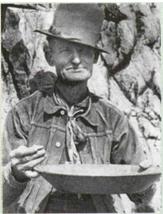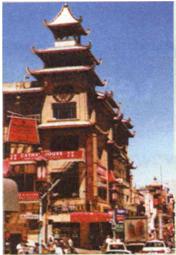-
(单词翻译:双击或拖选)
CALIFORNIA



California is the third largest state in the USA but has the largest population. It also has the distinction of being the most multicultural2 state in the USA, having attracted people from all over the world. The customs and languages of the immigrants3 live on in their new home. This diversity of culture is not surprising when you know the history of California.
NATIVE AMERCANS
Exactly when the first people arrived in what we now know as California, no one really knows. However, it is likely that Native Americans were living in California at least fifteen thousand years ago. Scientists believe that these settlers crossed the Bering Strait in the Arctic4 to America by means of a land bridge which existed in prehistoric5 times. In the 16th century, after the arrival of the Europeans, the native people suffered greatly. Thousands were killed or forced into slavery. In addition, many died from the diseases6 brought by the Europeans. However, some survived these terrible times, and today there are more Native Americans living in California than in any other state.
THE SPANISH
In the 18th century California was ruled by Spain. Spanish soldiers first arrived in South America in the early 16th century, when they fought against the native people and took their land. Two centuries later, the Spanish had settled in most parts of South America and along the northwest coast of what we now call the United States. Of the first Spanish to go to California, the majority were religious men, whose ministry7 was to teach the Catholic8 religion to the natives. In 1821, the people of Mexico gained their independence from Spain. California then became part of Mexico. In 1846 the United States declared war on Mexico, and after the war won by the USA, Mexico had to give California to the USA. However, there is still a strong Spanish influence in the state. That is why today over 40% of Californians speak Spanish as a first or second language.
RUSSIANS
In the early 1800s, Russian hunters, who had originally gone to Alaska, began settling in California. Today there are about 25,000 Russian-Americans living in and around San Francisco.
In 1848, not long after the American-Mexican war, gold was discovered in California. The dream of becoming rich quickly attracted people from all over the world. The nearest, and therefore the first to arrive, were South Americans and people from the United States. Then adventurers from Europe and Asia soon followed. In fact, few achieved their dream of becoming rich. Some died or returned home, but most remained in California to make a life for themselves despite great hardship. They settled in the new towns or on farms. By the time California elected to become the thirty-first federal10 state of the USA in 1850, it was already a multicultural society.
LATER A RRIVALS
Although Chinese immigrants began to arrive during the Gold Rush Period, it was the building of
the rail network from the west to the east coast that brought even larger numbers to California in the 1860s. Today, Chinese-Americans live in all parts of California, although a large percentage have chosen to stay in the "Chinatowns" of Los Angeles and San Francisco.
Other immigrants such as Italians, mainly fishermen but also wine makers11, arrived in California in the late 19th century. In 1911 immigrants from Denmark established a town of their own, which today still keeps up their Danish culture. By the 1920s the film industry was well established in Hollywood, California. The industry boom12 attracted Europeans including many Jewish13 people. Today California has the second largest Jewish population in the United States.
Japanese farmers began arriving in California at the beginning of the 20th century, and since the 1980s a lot more have settled there. People from Africa have been living in California since the 1800s, when they moved north from Mexico. However, even more arrived between 1942 and 1945 to work in the ship and aircraft industries.
MOST RECENT ARRIVALS
In more recent decades, California has become home to more people from Asia, including Koreans, Cambodians, Vietnamese and Laotians. Since its beginning in the 1970s, the computer industry has attracted Indians and Pakistanis to California.
THE FUTURE
People from different parts of the world, attracted by the climate and the lifestyle, still immigrate14 to California. It is believed that before long the mix of nationalities will be so great that there will be no distinct1 major racial or cultural groups, but simply a mixture of many races and cultures.



点击 收听单词发音
收听单词发音
 收听单词发音
收听单词发音
1
distinct

|
|
| adj.种类不同的,有区别的,清楚的,明显的 | |
参考例句: |
|
|
|
2
multicultural

|
|
| adj.融合多种文化的,多种文化的 | |
参考例句: |
|
|
|
3
immigrants

|
|
| n.移民( immigrant的名词复数 ) | |
参考例句: |
|
|
|
4
Arctic

|
|
| adj.北极的;n.北极 | |
参考例句: |
|
|
|
5
prehistoric

|
|
| adj.(有记载的)历史以前的,史前的,古老的 | |
参考例句: |
|
|
|
6
diseases

|
|
| n.疾病( disease的名词复数 );弊端;恶疾;痼疾 | |
参考例句: |
|
|
|
7
ministry

|
|
| n.(政府的)部;牧师 | |
参考例句: |
|
|
|
8
catholic

|
|
| adj.天主教的;n.天主教徒 | |
参考例句: |
|
|
|
9
miners

|
|
| 矿工( miner的名词复数 ) | |
参考例句: |
|
|
|
10
federal

|
|
| adj.联盟的;联邦的;(美国)联邦政府的 | |
参考例句: |
|
|
|
11
makers

|
|
| n.制造者,制造商(maker的复数形式) | |
参考例句: |
|
|
|
12
boom

|
|
| n.隆隆声;vt.发隆隆声 | |
参考例句: |
|
|
|
13
Jewish

|
|
| adj.犹太人的,犹太民族的 | |
参考例句: |
|
|
|
14
immigrate

|
|
| v.(从外国)移来,移居入境 | |
参考例句: |
|
|
|

















